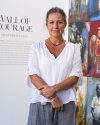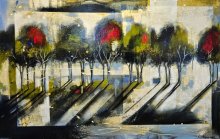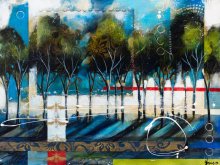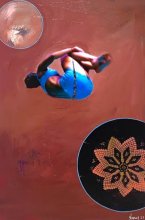Heather Haynes

Heather Haynes began her artistic career in 1995 after studying Visual Arts at McMaster University in Hamilton, Canada. For 10 years she self-represented and worked intently to develop her practice. In 2005, she entered the gallery circuit and since then has had the opportunity to show work in galleries and exhibits throughout North America.
Read moreA fierce vexation in gender inequality took Haynes to one of the world’s most despairing places, The Democratic Republic of Congo. There, she witnessed the impact of unspeakable cruelty and systemic injustices at every turn. She vowed to help in whatever way she could, intent on finding an accessible avenue. Then, a chance meeting with a Congolese gentleman who was caring for orphan children altered the trajectory of Haynes’ artwork, and life. It was those children who became the inspiration for a body of work that is Wall of Courage, an eighty panel installation honouring the resilience of the human spirit. Through a series of touring exhibitions, Wall of Courage has been the impetus to raise awareness and funds in the fight to eradicate poverty through education and healthcare, in communities in and around Goma, Democratic Republic of Congo.
In 2018, as a natural extension of her fundraising efforts and humanitarian themed artwork, Haynes formed a non-profit organization to add legitimacy to her endeavour. The Art of Courage is a platform for storytelling through art to create awareness, educate, advocate, and raise funds to change lives. The artwork and efforts continue to be noticed and Haynes’ circle of influence continues to grow. In 2020, Haynes was honoured to have Wall of Courage anchor the Human Element of Emergency on Planet Earth, a poignant exhibition at the UTA Artist Space in Los Angeles, curated by The United Talent Agency’s Director of Fine Art, Arthur Lewis.
Haynes continues creating social justice art, as her current work tackles issues of gender inequality. She believes that the most certain way for our world to recover environmentally, economically and socially, is to support, empower, and educate young girls; and yet females continue to face inequality, violence and fear, especially in developing countries.





